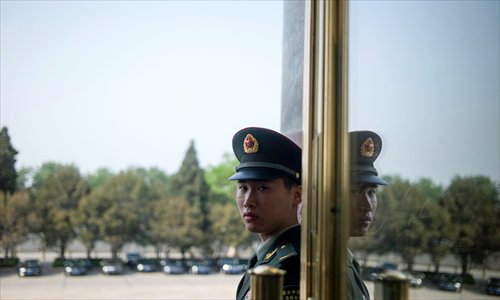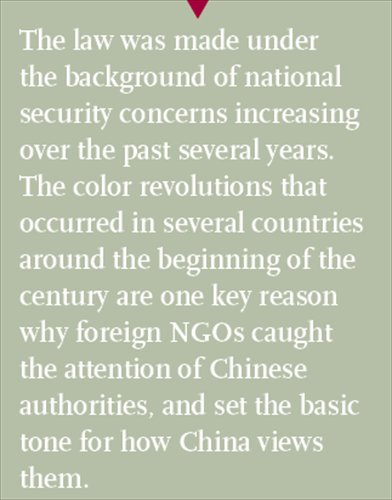Chinese NGOs receive less from overseas backers as new law stresses national security
China's latest law on the management of foreign NGOs, which will take effect in January 2017, has deterred foreign foundations from giving grants to domestic NGOs, as the law continues to spark debate in and outside of China due to its emphasis on public security controls.

A soldier stands guard at the Great Hall of People in Beijing. Photo: IC
It's been a month since China's new law on foreign non-governmental organizations (NGOs) was passed by the National People's Congress.
The law, which will take effect on January 1, 2017, provides a specific legal framework for foreign NGOs working in China for the first time.
Although the Chinese authorities have reiterated that the government welcomes foreign NGOs' law-abiding activities in China, the law's emphasis on control and supervision by local public security departments continues to spark controversy over whether and to what extent it will restrict foreign NGOs' activities in China.
Though the effects of the law will have on foreign NGOs in China have yet to become clear, it has already had side effects on domestic NGOs and the fields that these NGOs work in.
Since funding is included in the law's definition of foreign NGOs' activities in China, international foundations and NGOs which fund Chinese NGOs are also subject to the law's restrictions.
International charitable organizations are already giving less to China, especially since the second draft law was published in May last year. According to the China Foundation Rankings 2015, published in November, which asked 195 Chinese NGOs about their backers, funding from overseas grant-giving organizations such as international charitable foundations dropped by about 40 percent compared to results from a year earlier.
The decrease is particularly noticeable given that the total number of NGOs surveyed increased from 103 to 195, according to the survey, which was conducted by five grass-roots Chinese NGOs.
"There's widespread concern in the NGO sector that the [new law] will massively affect foreign NGOs' operations in and funding to China. From our survey, the decline in the number of overseas funders in China is happening faster and more drastically than expected," the report said.
Despite the decline, the report finds that foreign funders score higher on average than their domestic counterparts in terms of respecting Chinese NGOs, introducing resources to them, enhancing their capacity and flexibility in management, among other factors, and remains significant in their number and the amount of money they give.
Experts say part of the reason behind their decline in China can be attributed to China's growing economy, which has led some international foundations to decide to instead allocate their resources to less developed areas such as Africa and Southeast Asia.
But the legal environment is also a factor that affects overseas foundations' choice of recipients, experts say. "The grant-giving organizations choose their recipients strategically. It's a little like companies choosing where to set up their office. International foundations also take into account factors like legal environment and convenience of grant-giving," Jia Xijin, associate professor at Tsinghua University's NGO Research Center, told the Global Times.
Some Chinese NGOs have voluntarily cut their ties with foreign funders. Shawn Shieh, a Hong Kong-based expert on Chinese civil society, said he's heard of lots of Chinese organizations, not just NGOs but also other organizations like universities, that have refused or returned foreign funding in the past two or three years, either because they felt it was too sensitive or because they were not able to carry out their projects.
Shenzhen's Chunfeng Labor Dispute Service Center, for example, severed ties with its foreign funders at the end of 2014, after its overseas funding aroused suspicion from the local police.
In addition, since foreign NGOs contribute to various dimensions of Chinese society such as the economy, culture and environment, all these sectors will be affected to a greater or lesser degree.

Need for national security
According to the law, public security departments can investigate foreign NGOs, check or confiscate their documents and freeze their bank accounts if they are suspected of illegal activities.
The states that foreign NGOs which break Chinese law, illegally obtain State secrets, infringe China's national security and interests, engage in or fund political activities, illegally engage in or fund religious activities or other things that harm national and public interest will have their status revoked or be banned from organizing activities in China.
Apart from registering with public security departments, foreign NGOs which want to set up offices in China must also find and obtain approval from a business supervisory unit under the law. Those who don't have offices in China, but wish to organize activities in the country, will need to find a Chinese government department or NGO partner to apply to the local public security bureaus on their behalf.
Professor Jia said the law was made under the background of national security concerns increasing over the past several years. The color revolutions that occurred in several countries around the beginning of the century are one key reason why foreign NGOs caught the attention of Chinese authorities, and set the basic tone for how China views them, she said.
Her view is echoed by Huang Haoming, deputy director of the China Association for NGO Cooperation. "The law shows that China is shifting its emphasis from traditional security issues, such as military and territorial security, to non-traditional security issues that can potentially influence a country," he told the Global Times.
But Jia said laws with a national security focus should target the specific activities that pose a risk, such as financial and information security. "It is a misfit to consider overseas NGOs as an independent subject in a law that's made with a national security perspective," she told the Global Times.
Shieh, the civil society expert, also said the law is biased against foreign NGOs. "We understand that China needs to have a law or regulations for all NGOs, both domestic and foreign, but we don't think it's a good idea to have a separate law for foreign NGOs," he told the Global Times.
Historically, the Chinese government has had mixed feelings toward foreign NGOs. While foreign NGOs working on human rights, democracy and religion have always been viewed with great suspicion by the Chinese government, those that work in fields such as education, environment and poverty relief have often received little interference.
Among nationalist scholars, however, the idea that foreign NGOs are part of a Western conspiracy to ideologically influence and thereby undermine China is still widespread, especially as it has been reported some foreign foundations support groups they see as anti-China.
The latest such case occurred on May 18, when Japanese newspaper Asahi Shimbun revealed that the Washington-based National Endowment for Democracy provided $96.52 million to at least 103 groups involved in anti-China activities, including some that have been designated as terrorist groups by China such as the World Uyghur Congress and the Tibetan Youth Congress.
This example shows why a foreign NGO law is necessary, according to Hua Chunying, Ministry of Foreign Affairs spokeswoman, who said that organizations that attempt to subvert China's political power, undermine national security or impair China's national and public interests on Chinese territory should be held accountable by the government in accordance with the law.
NGO reactions
The law sparked a strong response abroad after it was passed. On May 3, several UN human rights experts urged the Chinese government to repeal the law, fearing it will be "wielded as a tool to intimidate, and even suppress, dissenting views and opinions in the country."
Hong Lei, Ministry of Foreign Affairs spokesperson responded that "What they said is full of prejudice and untrue accusations against China, ruthlessly interfering in China's legislative sovereignty and internal affairs."
Most international NGOs who have offices in China, such as the Ford Foundation, Greenpeace, the International Fund for Animal Welfare and the Carter Center declined requests to comment on the law and how it will affect them when reached by the Global Times.
Li Qiang, founder and executive director of China Labor Watch (CLW), a New York-based non-profit, said it's yet too early to predict how the law will affect NGOs in China. "What we know so far is that we'll need to register with the public security authorities before holding events, the rest we can only take one step at a time," he told the Global Times.
Li said as a foreign labor NGO, a field which is considered politically sensitive, the activities of the CLW have always been closely scrutinized by the internal security department of the local Public Security Bureau. "We are often asked to go for a chat by these officers, and the local government once asked us to move our office," he said.
Another Hong Kong-based labor NGO, which declined to be named because of the sensitivity of the issue, said the law will definitely make it more difficult for them to operate in the Chinese mainland including registering, carrying out activities and raising funds.
Huang said, "the new law will raise the operational cost for foreign NGOs. Some might quit China. It will also make it more difficult for foreign NGOs to collaborate with their Chinese counterparts."
However, since it's still unclear how strictly the government will enforce the law, its exact influence is yet to be seen. He hopes the authorities will issue a more detailed explanation of the law so as to clarify some ambiguous articles.
Newspaper headline: Fading funding